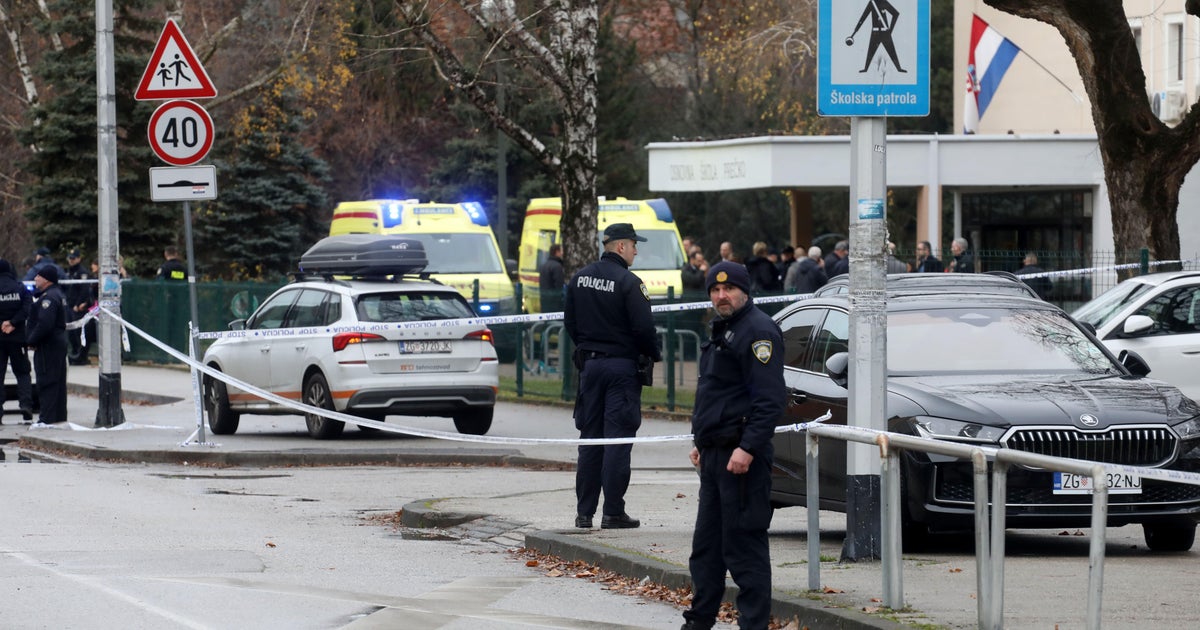Hong Kong protesters defy ban to challenge Beijing on Communist China's 70th birthday
Hong Kong — Thousands of black-clad protesters marched in central Hong Kong as part of multiple pro-democracy rallies Tuesday urging China's Communist Party to "return power to the people," as the party celebrated its 70th year of rule. The protesters defied a police ban to march along a broad city thoroughfare, chanting anti-China slogans and carrying Chinese flags defaced with a black cross.
Chaos erupted as hundreds of riot-equipped police swooped in to try and break up the protests, and CBS News correspondent Ramy Inocencio said video posted online appeared to show one protester being shot at almost point-blank range in the chest by a police officer with a handgun. The wounded protester survived and was being treated for his injury.
Leading pro-democracy activist Joshua Wong told CBS News that he and the other demonstrators felt it was their duty to turn the "dream" of enduring democracy in Hong Kong into a reality, but Inocencio said the scenes on Tuesday were more of a nightmare.
Many protesters tossed wads of fake "hell" bank notes usually used at funerals into the air. "The leaders who won't listen to our voice, this is for them," said marcher Ray Luk.
The Hong Kong police confirmed that they were using tear gas to try and disperse the protesters.
A large group of demonstrators cheered as some from among their ranks tore down a huge red banner, posted by officials on a building in the city's Central district to mark the 70th anniversary, and set it alight.
Police warned Monday that hard-line protesters may engage in extreme acts that are "one step closer to terrorism," such as killing police officers, posing as police officials to kill civilians and large-scale arson, including at gas stations. Activists ridiculed the assertion as a scare tactic.
Some police officers and news media said a few protesters had thrown a corrosive substance at the riot police in the streets. At least one officer was pictured with what appeared to be chemical burns on his clothing and body in photos posted on social media by the police force.
The protests began in early June over a now-shelved extradition bill that activists say was an example of how freedoms and citizen rights in the semi-Chinese territory's autonomy are being eroded. The movement has since snowballed into an anti-Chinese campaign.
Several smaller rallies are occurring in further districts under a tight security clampdown. At least 11 subway stations were closed, and scores of police stood guard outside government offices.
At the Wong Tai Sin area, riot police twice fired tear gas to disperse hundreds of protesters. Outside a city hall in the Tuen Mun area, police with batons charged at protesters who hurled umbrellas and other objects in their direction.
"Today we are out to tell the Communist Party that Hong Kong people have nothing to celebrate," said activist Lee Cheuk-yan as he led the downtown march. "We are mourning that in 70 years of Communist Party rule, the democratic rights of people in Hong Kong and China are being denied. We will continue to fight."
Activists carried banners saying "End dictatorial rule, return power to the people."
Many shopping malls across Hong Kong were shut amid fears of chaos. Posters in the city called for the Oct. 1 anniversary to be marked as "A Day of Grief."
Dressed in a black T-shirt and dark jeans, 40-year-old Bob Wong said his clothing expressed "mourning" over "the death of Hong Kong's future."
The popular LIHKG online chat forum used by protesters was inaccessible on cellphones, a move believed to have been made to prevent communication by protesters.
Hong Kong Chief Secretary Matthew Cheung told hundreds of guests at a reception that the city has become "unrecognizable" due to violence by protesters. Cheung was representing the city's leader, Carrie Lam, who led a delegation joining the National Day festivities in Beijing.
Cheung said Beijing fully supports the "one country, two systems" framework that gives Hong Kong freedoms and rights not enjoyed on the mainland. The system was implemented when the former British colony returned to Chinese rule in 1997.




